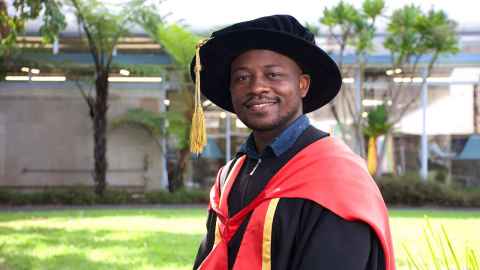Lighting the way for those to come: a graduate's story
4 May 2022
From Ghana to Aotearoa, via Norway, education graduate Joshua Sarpong is forging a path for others to follow.

Joshua Sarpong did a lot of his early study by lantern light.
Graduating from the University of Auckland with a PhD in Education, Joshua says the lack of access to electricity in his home country, Ghana, was a constant challenge of his student life.
“I was born and raised in a small farming community called Pokukrom in the Ashanti region, and there was no electricity in the village, so we had to share lanterns.
“And even when I went to KNUST senior high school in a nearby city (Kumasi) where I lived with my auntie, she didn’t have electricity either, so I still had to use a lantern to study. Torches need batteries, which were too expensive for a student.”
Joshua was the first in his family to attend senior high school and initially thought he was destined to go the same way as his brother, also a bright student who wasn’t able to continue because of the family finances.
“I felt deep down that I couldn’t learn a trade or work on a farm, the only thing I wanted was to go to school and study more, so I went on a hunger strike; I told myself, ‘no school, no food’, I wanted my parents to know how serious I was,” he says.
Lack of access to electricity in his home country, Ghana, was a constant challenge of his student life.
Fortunately his parents somehow managed to scrape together the money and he was able to keep studying.
“School is not expensive in Ghana, but it is if you’re already struggling for basic things. I knew it was a privilege to be at school so I really enjoyed my studies and I worked very hard with the few resources I had.”
Joshua went on to attend the University of Ghana in the capital, Accra, where he majored in political science with information studies.
“For that degree I got a scholarship to cover tuition fees and some books, but I was hungry so I used the money for food, not books; Maslow before Bloom!”
He received offers from Canada and Norway to continue postgrad studies and ended up choosing Norway as the financial aid covered everything, “even the plane ticket”.
“Norway is a lovely place to study, I was in Oslo. Everyone does well there, unlike those very capitalist countries where you get extremes of the very rich and the very poor.”
It was also the first time he had access to a personal computer.
“That was in 2014 when I was doing my masters. Before then, it was all pen and paper and relying on other people’s computers.”
I feel it’s now time to focus on other aspects of life such as starting my own family and helping young people in low-income families accomplish their goals.
Knowing he wanted to keep going to doctorate level, he then had another choice to make, between Canada and New Zealand.
“I didn’t know a lot about New Zealand but the Faculty of Education at Auckland is ranked among the top in the world, and that really influenced my decision. Also it’s possible to do research straight away rather than coursework for the first two years, and that was attractive as well.”
Joshua’s PhD thesis looked at the tension between universities needing a range of funding sources to survive, and the consequent risks of having their academic freedom and role of ‘critic and conscience’ curtailed.
“I developed the concept of strategic entrepreneurialism to explain how universities can gain resources without compromising academic freedom.”
Although he’s without family here, he’s been ‘adopted’ by Stuart and Judi Tiller, a lovely couple who have been like second parents to him, and he works as a doctoral research coordinator in the same faculty (Education and Social Work) where he studied.
His goal is to keep studying and publishing, but also to finally take a breath.
“I feel it’s now time to focus on other aspects of life such as starting my own family and helping young people in low-income families accomplish their goals.”
Meanwhile, when he walks across the stage to get his degree he knows that not only his parents, but his whole village and wider community will be cheering him on.
“They know what I’ve been through to get to this level. I think everyone feels inspired, and many now feel they can also do what I’ve done. I’m a bit of a role model for them.”